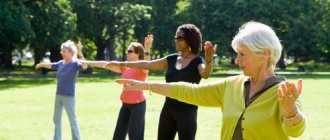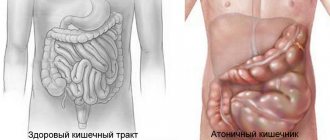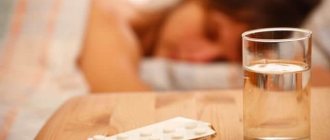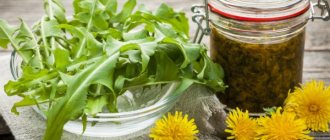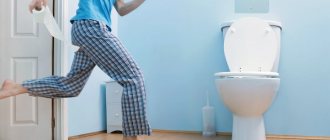Causes of the problem
First you need to determine what constipation is. This is a condition in which:
- bowel emptying has not occurred for more than two days or occurs less than 3 times a week;
- visiting the toilet occurs more often, but the process of defecation requires significant physical effort;
- after visiting the toilet there is a feeling that the intestines are not completely emptied;
- To empty the intestines, additional help is required in the form of pressure on the perineum and others.
If one of these symptoms is present, we can talk about constipation in older people. It can arise due to a number of reasons, among which the main one is a weakening of intestinal motor function. In addition, older people usually move less, so external assistance to the intestines in the form of movement of the surrounding muscles is reduced.
How does constipation occur with hemorrhoids?
Also, with age, the sensitivity of the anal sphincter decreases, as a result of which people do not feel that they need to go to the toilet, and the process of defecation is disrupted. In addition, the development of constipation is promoted by:
- insufficient amount of fluid consumed;
- poor nutrition;
- lack of vitamins;
- taking certain medications;
- certain diseases and others.
Main causes of constipation in the elderly
Age-related physiological factors
- Reduced sensitivity to rectal distension.
- Changes in the composition of intestinal microflora.
- Loss of muscle tone in the intestines, abdominals and pelvic floor.
- Poor chewing of food due to age-related problems with the dentition.
Lifestyle of
an elderly person
- Drinking insufficient amounts of water (up to 1.5 liters).
- Unbalanced diet.
- Insufficient physical activity.
Taking certain groups of medications
- Analgesics.
- Antibiotics.
- Antidepressants.
Presence of certain diseases and conditions
- Atherosclerosis.
- Bowel cancer.
- Diabetes mellitus.
- Parkinsonism.
- Depression.
Treating constipation with diet
Before starting any method of treating chronic constipation, you should consult a doctor and consult about the methods used. Since an elderly person often has a whole complex of concomitant diseases that limit the use of certain treatment mechanisms. So, sick joints will not allow you to increase physical activity, and problems with digestion will not allow you to use some products.
Sample menu for an elderly person with constipation
The most affordable and safest way to treat constipation in an elderly person is to change the diet. The basis of therapeutic nutrition should be foods rich in fiber, both fresh and prepared in various ways. These are primarily vegetables, fruits, wholemeal bread and cereals. Fiber enhances intestinal motility, helping with its natural release. Fiber can also be consumed separately as a dietary supplement; it is produced by many companies and can be purchased in pharmacies. However, when taking it, you should remember that fiber can swell in the stomach, causing a feeling of fullness, so it should be used in its pure form in small quantities.
You need to eat at the same time in small portions 5-6 times a day. This helps form a reflex in which digestive juices will be released at the same time, helping to digest food.
The same will happen with the large intestine; when a reflex is developed, it will be emptied at the same time, which will not allow feces to accumulate and constipation to form.
A diet for constipation should include the following foods:
- soups with meat, fish or vegetable broth;
- omelette or hard-boiled eggs;
- lean meat: poultry, veal;
- dairy products;
- fresh fruits and vegetables, processed, dried fruits;
- porridge with water: buckwheat, wheat, oatmeal;
- wholemeal bread, bran;
- cheese and butter;
- at least 1.5 liters of water per day.
In case of defecation disorders, the following should be excluded from the menu:
- fast food;
- smoked meats;
- animal fats;
- pasta;
- celery and legumes;
- strong tea and coffee, carbonated drinks;
- baked goods and chocolate;
- spicy, salty, pickled foods;
- sauces and seasonings for dishes.
Diet
The diet is not as effective in older people as it is in younger people. But elderly people also need to follow a diet if they have a tendency to retain stool. If you have difficulties with bowel movements, it is recommended to use:
- Fresh vegetables and fruits.
- Cereals, except semolina and rice. Porridge and cereal soups are allowed.
- Low-fat varieties of fish and poultry.
- Low-fat fermented milk products - kefir, yogurt.
Drinks allowed include mineral water and freshly squeezed fruit juices.
Food must be chewed thoroughly. It is better to give up confectionery, beans, coffee and tea. Like young people, older patients need fiber for the normal functioning of their digestive organs.
Drug treatment
If following a diet for an elderly person does not help solve intestinal problems , one has to resort to drug treatment .
The use of medications involves the use of mild drugs that have little effect, since strong laxatives disrupt digestion and cannot be used continuously.
To quickly treat constipation in the elderly, use:
- For cases of chronic constipation : Prelax, Forlax, Mucofalk and Fitomucyl. This group of drugs prevents the outflow of fluid from the intestines, thereby helping to soften stool and make it easier to pass;
- When the motor activity of the intestinal walls decreases, Coordinax, Cerucal, Dulcolax, Guttalax are recommended. The substances contained in them enhance intestinal motility, restore its peristalsis and increase the nervous sensitivity of the receptors contained in the walls. All this causes softening of the masses and their gentle, rapid removal from the body;
- Drugs with irritating effects : Senade, Regulax, Bisacodyl, castor oil. They act on the intestinal walls, stimulating their motility and faster movement of formed feces.
Treatment of patients on bed rest
If the patient’s motor functions are practically absent, it is necessary to use an enema to normalize intestinal function. Constipation in a bedridden patient is a common occurrence that worsens his condition. The cause of the condition may be a lack of physical activity. Relatives should help cope with this condition. Relatives are obliged to provide the patient with the most comfortable living conditions, proper care, proper nutrition and adequate treatment. Ways to relieve constipation in bedridden patients:
- Enema with mineral water. Mineral water dilutes stool and cleanses the intestines, bringing them out. Along with the feces, pus and mucus come out. The liquid must first be slightly warmed up, and then in a volume of 100 ml. enter the intestines through the anus. After a few minutes, the intestines will empty, and the patient will feel better.
- At home, you can make an enema from a decoction of medicinal herbs. It will help cope with fecal stagnation, but will not improve the functioning of the gastrointestinal tract. First you need to prepare an infusion of chamomile, linden, and motherwort. The ingredients are mixed and cooked for 20 minutes. The broth is filtered and cooled. Then it is introduced into the intestines using a pear.
Prolonged lying down significantly worsens human health. Delayed defecation is a common companion for such patients. Stagnation of feces leads to intoxication of the body and a deterioration in the general condition of the patient. In cases where the problem cannot be resolved at home, an ambulance will be required.
Folk remedies for the treatment of constipation
The most affordable and delicious folk remedy for constipation is a mixture of dried fruits. To prepare it use
- dried apricots,
- prunes and figs,
- you can add walnuts.
- Dried fruits are ground in a meat grinder or blender, a small amount of lemon juice and honey is added, mixed and stored in a closed jar in the refrigerator.
- To be effective, it is enough to eat a tablespoon of the mixture daily ; it also helps as a preventive measure. To enhance the effect, you can add flax seeds and senna leaves to the mixture.
Bran
They can also be purchased at a pharmacy.
- Pour two tablespoons of bran into a glass of boiling water and leave for an hour.
- After the mixture has swollen, it can be added to kefir or yogurt at the rate of 1 tablespoon per glass of fermented milk products, and drunk an hour before meals in the morning.
Rowan berry infusion for constipation
A quick-acting folk remedy is an infusion of rowan berries.
- The berries are covered with sugar in a 2:1 ratio and left in a dark place for a month.
- Then the juice that appears is drained, diluted in half with alcohol and taken before meals, a tablespoon diluted with water.
Recipe with valerian and dill
To treat long-term constipation, use an infusion of valerian and dill.
- To prepare it, take 1 teaspoon of valerian root and dill seeds, pour half a liter of boiling water and leave overnight in a warm place.
- In the morning, the liquid is filtered and 2 tablespoons of vegetable oil are added to it. This mixture is taken in the morning on an empty stomach, 1 teaspoon.
A mixture of senna and buckthorn for the elderly
A mixture of senna and buckthorn will help normalize the emptying process.
- 4 tablespoons of vegetable raw materials are poured with a glass of boiling water and heated for 10-15 minutes over low heat.
- Then cover with a lid and let it brew.
- Take half a glass warm before meals.
Treatment with flax seeds
In folk medicine, flaxseed is actively used to treat constipation. To prepare the decoction, pour boiling water over a teaspoon of the seed and leave in a steam bath for half an hour. Then add a little water, remove from heat and allow to cool. The decoction is taken half a glass at night.
Effective constipation remedies for elderly bedridden people
Defecation disorders in bedridden patients are associated with the lack of constant mild stimulation of contractions of the intestinal wall, which is carried out through physical activity in healthy people. Therefore, the main task in the fight against constipation in this case is the correct choice of drugs that activate peristalsis. Instant remedies are not suitable for this. It is recommended to use drugs for the treatment of chronic constipation, the active ingredients of which are macrogol, lactulose, and polyethylene glycol.
According to the advice of gastroenterologists, for elderly bedridden patients with constipation, the following are suitable:
- Duphalac
is a probiotic, a lactulose-based drug in syrup form. The medicine stimulates the contraction of the intestinal walls, softens its contents, changes the microflora of the colon, and increases the acidity in its lumen. Does not affect smooth muscles and mucous membranes. The dosage depends on the individual characteristics of the body and is selected by the attending physician. This constipation medication can be used continuously for longer than six months. Complete analogues of Duphalac: Normaze, Portalak. Contraindications for use: suspected appendicitis, lactose intolerance, rectal bleeding. - Forlax
is a constipation remedy for older people with an osmotic effect that increases the volume of intestinal contents. The active ingredient is macrogol. Release form: powder. Effective 24–48 hours after application. Duration of use - up to three months. Dosage - no more than four sachets per day. Before use, dissolve the powder in 50 ml of warm water and take the resulting product morning and evening. Forlax is safe and recommended to combat constipation even in children. There are practically no side effects. Contraindications for use: intestinal obstruction, unspecified abdominal pain, Crohn's disease.
Physical exercise
Constipation can be relieved with regular physical activity. Its level depends on the condition of the elderly person. The most accessible way is walking in the fresh air. If possible, these may be other loads.
Every day at home you can do a little exercise to help your intestines work:
- Lying down, pull your legs towards you and bend your knees, pressing firmly to your stomach, hold it for a few seconds and lower it. Repeat several times with each leg;
- Perform “Bicycle” and “Scissors” exercises with your feet;
- Place your hands on your stomach and try to inflate it as you inhale, and retract it as you exhale;
- Periodically retract and protrude the muscles of the anus.
The problem of constipation in older people is very relevant, and in most cases it can be dealt with without resorting to drug treatment. It is enough to adhere to a little physical activity and follow some nutritional rules recommended at any age.
Symptoms of intestinal dysfunction
Recognizing bowel dysfunction that is accompanied by constipation is quite simple. The first thing that should raise suspicion is the absence of bowel movements for more than two days. If a person defecates regularly, then the presence of constipation can be recognized the very next day after stool retention.
Constipation also means difficulty in emptying or partial passage of stool. If after defecation there remains a feeling of fullness in the intestines, then the cleansing has not been completed completely. This indicates poor peristalsis that needs treatment.
Among the main symptoms of problematic stool are:
- stool that is too dry and hard;
- defecation is accompanied by damage to the anus (fissure);
- lack of stool for several days in a row;
- feeling of fullness in the stomach;
- bloating and rumbling;
- loss of appetite, etc.
If the absence of bowel movements lasts more than 3-4 days, then mild nausea and lethargy join the symptoms. These signs are a signal of the onset of intoxication, and if the intestines are not cleansed, the patient’s condition will worsen every day.
Medicinal plants
For constipation, various medicinal herbs are often used. These medicinal plants provide effective treatment in the form of decoctions and infusions. They have no side effects, which means they have almost no contraindications.
- Dandelion. The root of this plant is used, finely chopped and filled with cold water. Leave overnight, then strain and take in small sips before meals.
- A collection is prepared from yarrow, nettle and buckthorn. Steam a tablespoon with a glass of boiling water. Take 100 ml before bedtime.
- Burdock burdock. A special infusion is prepared from 100 g of seeds and the same amount of water. Brew in a water bath for 30 minutes, then remove and leave for another few hours. Then strain well and drink in one go.
- Elderberry leaves. A decoction of the leaves is prepared with the addition of honey. It is better to take young leaves. They prepare delicious tea, which is taken after meals. Before preparing tea, thoroughly wash each leaf under running water, then pour boiling water over it.
Using folk remedies, you can very easily and quickly cure constipation in older people. It is enough to choose the appropriate drug for each person.
A wide variety of recipes allows you to choose a medicine individually and for every taste. But before each use, you should consult your doctor.
Intestinal atony
This condition is provoked by physiological aging and a decrease in motor activity, as well as a decrease in the sensitivity of the rectum - it is this that should signal the brain that it is time to go to the toilet.
Symptoms:
- cramping abdominal pain;
- ineffective urge to defecate;
- belching;
- nausea;
- constant stool retention.
To understand why constipation occurs in old people and what to do, you should undergo an examination, identify and monitor the regularity of trips to the restroom. Such tasks are handled well in boarding houses such as “Zabota”, where full care is provided.
Healing rhubarb
Few people know, but rhubarb has long been considered an excellent cure for constipation. This unpretentious plant grows in many areas along with other plants.
It has gained wide popularity among older people who treat constipation with folk remedies. But you should know that rhubarb is addictive, so it cannot be used as a medicine for a long time.
Treatment consists of providing a laxative effect on the intestines in large quantities. A small dosage of this healing medicine can have the opposite effect.
The root of this plant is used for preparation. You only need 2 tablespoons of roots, which are crushed in a blender or on a fine grater.
This amount is poured into 1 glass of boiling water, infused and filtered. Before bedtime, take 100 ml once a week.
Preventing constipation
If an elderly patient has already developed this malfunction of the body, then one should not carelessly use drugs with a laxative effect. You need to be aware of their features and perform competent actions. Let's look at this in detail.
We do not recommend starting to search for and take medications on your own. They should be prescribed by a doctor after examination. What will be an effective assistant for one may not be suitable for another.
Let's look at some popular solutions:
- The most common method used to treat this condition is the ingestion of laxatives. A more serious type is annoying. They are used to urgently deal with a problem. In the second case, it is prescribed mainly due to intestinal atony.
- Another way is osmotic, which will retain water in the body. These are magnesium sulfate and Forlax.
- The safest of these are prebiotics. They are natural, smoothly and slowly affect the difficulty of stool, but the result obtained from taking them will last longer. Among the popular ones are Lactose and Inulin.
To minimize the risk of fecal impaction formation, we recommend reducing or eliminating the following from your diet:
- cow's milk;
- chocolate;
- White rice;
- baked goods;
- kvass;
- mushrooms;
- alcohol;
- fast food;
- radishes and radishes.
To activate the digestive tract, you should move more. If a person is active, the more regular and better the trips to the toilet will be.
He needs to be sent for walks or to the pool, and insisted that he do gymnastics.
Flax seeds
This is a useful product that is often used to combat delayed bowel movements. They can be added raw to food, drunk as an oil or as a decoction. The minimum course is 14 days.
Abdominal massage
If doing exercises is too difficult, use massaging to improve motor skills. This way relieves spasms and speeds up digestion. Self-massage is necessary for up to 10 minutes daily, gradually increasing the pressure.
Blood during bowel movements
This symptom signals several disorders of the gastrointestinal tract:
- inflammation;
- active reproduction of pathogenic flora;
- tumor formation;
- thinning of the walls of blood vessels;
- stomach or duodenal ulcer.
In any case, you need to see a doctor as soon as possible.
Quite often, difficulty in defecation is complemented by flatulence and accompanied by nausea. This significantly reduces appetite and increases gas formation.
Main reasons:
- bakery products;
- long feasts;
- a lot of fatty and fried foods;
- soda, kvass, beer.
Treatment should only be comprehensive. You need to do gymnastics, adhere to a diet, monitor microflora and, if necessary, take appropriate medications. Only a doctor can describe the action plan and correct it.
Bran for therapy
A great way to stimulate the intestines and remove toxins. It is often used when there is little physical activity, but only if the difficulty is caused by temporary reasons that are not caused by serious internal lesions.
This is fiber that swells in the stomach and, moving through the gastrointestinal tract, collects waste, toxins and everything else that was stored on the walls. During prevention, you need to drink a lot of water, otherwise the process will be the opposite of what was expected.
These are beneficial bacteria that are found in foods and special preparations. It is important to include them in food to maintain normal microflora levels. Thanks to them, the flora remains viable and has a beneficial effect on the condition of the body.
Soap for constipation
This method comes from Soviet times. Use it carefully to avoid chemical burns. You need to take a piece and insert it into the rectum. The effect will occur within a few minutes. But medicine considers this method irrelevant and dangerous.
This fermented milk drink should be consumed at any age due to the positive effects of bacteria, milk fungus and fermentation. It increases appetite, contains calcium, phosphorus and normalizes organ function. But it only helps with minor difficulties. If serious difficulties arise, they should be treated and not left to chance.
It is no secret that pensioners may have various kinds of physical and psychological problems that cannot be dealt with at home. Therefore, if there are elderly people in your family and it is difficult for you to care for them, contact the “Zabota” boarding house network. We have been successfully operating since 2008 and during this time we have been providing a better quality of life for older people, as well as prolonging their activity and longevity.
What foods improve gastrointestinal motility?
For constipation, the menu includes foods that restore the motility of the large intestine, namely those that contain:
- sugar (syrups, honey, jam);
- salt (salted fish, snacks, salted vegetables);
- organic acids (fermented and pickled vegetables, sour fruits and juices based on them, fruit drinks, fermented milk products);
- fiber (bran, dried fruits, legumes, whole grain bread, nuts, cereals, raw vegetables);
- carbon dioxide (carbonated drinks, kvass, kumiss);
- free fat (vegetable oil, sour cream, cream).
Cold dishes (less than 15 degrees Celsius) that are consumed on an empty stomach (cold soups, beetroot soup, okroshka, drinks) accelerate intestinal motility.
Foods that can swell are also beneficial for the digestive system, for example, seaweed, bran, and fiber, since they increase in volume and help eliminate harmful substances.
Main causes of constipation in the elderly
Age-related physiological factors
- Reduced sensitivity to rectal distension.
- Changes in the composition of intestinal microflora.
- Loss of muscle tone in the intestines, abdominals and pelvic floor.
- Poor chewing of food due to age-related problems with the dentition.
Lifestyle of
an elderly person
- Drinking insufficient amounts of water (up to 1.5 liters).
- Unbalanced diet.
- Insufficient physical activity.
Taking certain groups of medications
- Analgesics.
- Antibiotics.
- Antidepressants.
Presence of certain diseases and conditions
- Atherosclerosis.
- Bowel cancer.
- Diabetes mellitus.
- Parkinsonism.
- Depression.

